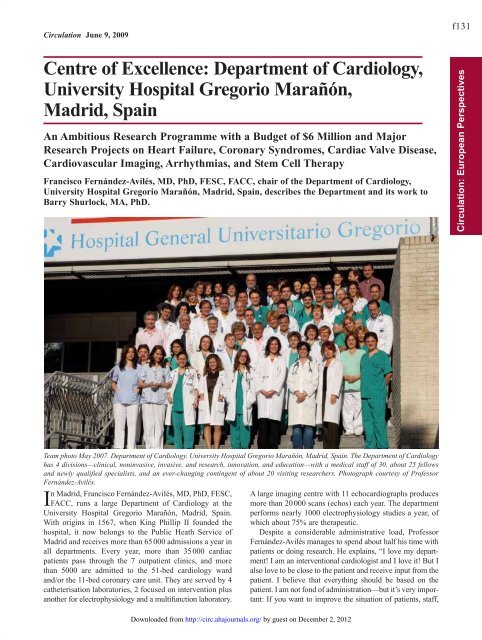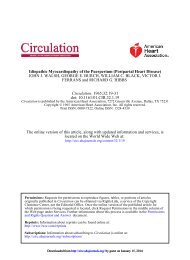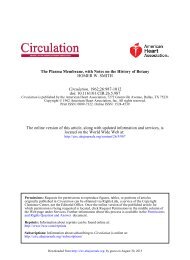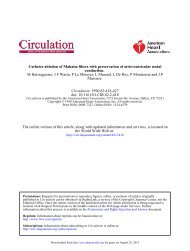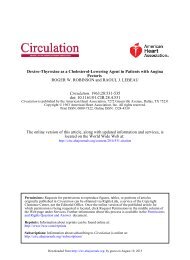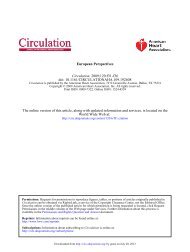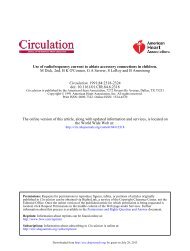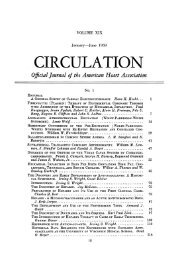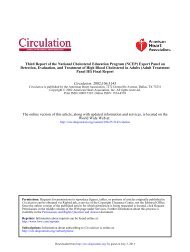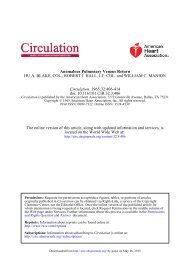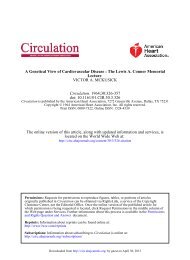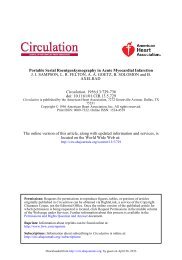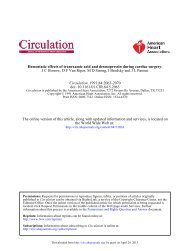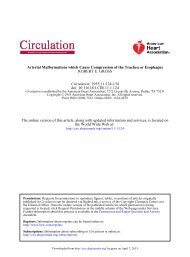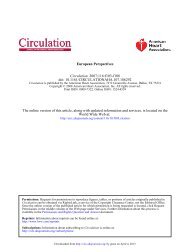Francisco Fernández-Avilés, MD, PhD, FESC, FACC - Circulation
Francisco Fernández-Avilés, MD, PhD, FESC, FACC - Circulation
Francisco Fernández-Avilés, MD, PhD, FESC, FACC - Circulation
Create successful ePaper yourself
Turn your PDF publications into a flip-book with our unique Google optimized e-Paper software.
<strong>Circulation</strong> June 9, 2009<br />
Centre of Excellence: Department of Cardiology,<br />
University Hospital Gregorio Marañón,<br />
Madrid, Spain<br />
An Ambitious Research Programme with a Budget of $6 Million and Major<br />
Research Projects on Heart Failure, Coronary Syndromes, Cardiac Valve Disease,<br />
Cardiovascular Imaging, Arrhythmias, and Stem Cell Therapy<br />
<strong>Francisco</strong> <strong>Fernández</strong>-<strong>Avilés</strong>, <strong>MD</strong>, <strong>PhD</strong>, <strong>FESC</strong>, <strong>FACC</strong>, chair of the Department of Cardiology,<br />
University Hospital Gregorio Marañón, Madrid, Spain, describes the Department and its work to<br />
Barry Shurlock, MA, <strong>PhD</strong>.<br />
Team photo May 2007. Department of Cardiology. University Hospital Gregorio Marañón, Madrid, Spain. The Department of Cardiology<br />
has 4 divisions—clinical, noninvasive, invasive, and research, innovation, and education—with a medical staff of 30, about 25 fellows<br />
and newly qualified specialists, and an ever-changing contingent of about 20 visiting researchers. Photograph courtesy of Professor<br />
<strong>Fernández</strong>-<strong>Avilés</strong>.<br />
In Madrid, <strong>Francisco</strong> <strong>Fernández</strong>-<strong>Avilés</strong>, <strong>MD</strong>, <strong>PhD</strong>, <strong>FESC</strong>,<br />
<strong>FACC</strong>, runs a large Department of Cardiology at the<br />
University Hospital Gregorio Marañón, Madrid, Spain.<br />
With origins in 1567, when King Phillip II founded the<br />
hospital, it now belongs to the Public Heath Service of<br />
Madrid and receives more than 65000 admissions a year in<br />
all departments. Every year, more than 35000 cardiac<br />
patients pass through the 7 outpatient clinics, and more<br />
than 5000 are admitted to the 51-bed cardiology ward<br />
and/or the 11-bed coronary care unit. They are served by 4<br />
catheterisation laboratories, 2 focused on intervention plus<br />
another for electrophysiology and a multifunction laboratory.<br />
A large imaging centre with 11 echocardiographs produces<br />
more than 20000 scans (echos) each year. The department<br />
performs nearly 1000 electrophysiology studies a year, of<br />
which about 75% are therapeutic.<br />
Despite a considerable administrative load, Professor<br />
<strong>Fernández</strong>-<strong>Avilés</strong> manages to spend about half his time with<br />
patients or doing research. He explains, “I love my department!<br />
I am an interventional cardiologist and I love it! But I<br />
also love to be close to the patient and receive input from the<br />
patient. I believe that everything should be based on the<br />
patient. I am not fond of administration—but it’s very important:<br />
If you want to improve the situation of patients, staff,<br />
Downloaded from<br />
http://circ.ahajournals.org/ by guest on December 2, 2012<br />
f131<br />
<strong>Circulation</strong>: European Perspectives


